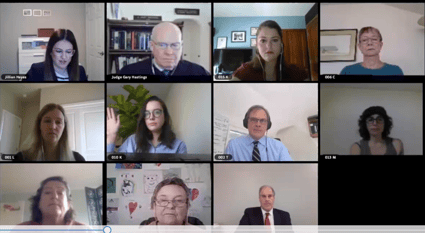July 16, 2020
From Voir Dire to Verdict—Online Courtroom Project’s Demonstration Online Jury Trial Results are in!

The Online Courtroom Project has just finished a comprehensive report on their two day online demonstration trial conducted on June 26th and 27th. With many courts struggling with significant case backlogs and balancing the health risks of holding in-person trials while continuing to provide access to our justice system, this report details how online jury trials can occur online. The report details the process of how we went about designing and testing an online trial, the obstacles we had to overcome, what happened over the two days, the observations of the judges and attorneys involved in the project, and recommendations for the courts and the legal profession on how to manage an online jury trial. Meant as preliminary user’s guide to help the justice system understand the nuts and bolts of this new arena, we hope to engage as many constituents of the courts to give them tools to deal with this new litigation world. Some of the highlights of the report include findings that:
- Attorneys could use online jury questionnaires and online voir dire to have meaningful discussions with jurors in order to make cause and peremptory challenges.
- Attorneys could clearly deliver opening statements and closing arguments, as well as present witnesses and demonstrative evidence to jurors.
- Jurors were attentive during the trial and could see witnesses clearly as well as judge their credibility.
- Jurors could see and hear each other during deliberations.
- A judge could handle objections, sidebar conferences, and clearly communicate instructions to jurors and admonish them about the rules of performing their jobs.
While online trials are a different forum and all trial participants need to adjust their expectations and employ different skills, there were aspects of the trial process that prior jurors felt worked even better in an online environment.
The COVID-19 pandemic has challenged all of us to innovation and creative solutions to make sure our Constitutional right to jury trials, as a cornerstone of our democracy continues.
For the full report see: https://www.onlinecourtroom.org/demonstration-report
For recordings of parts of the online trial see: https://www.onlinecourtroom.org/demonstrationtrial
About Online Courtroom Project
The Online Courtroom Project (“OCP”), an advisory group of judges, attorneys, researchers, consultants, and technology specialists with experience in thousands of jury trials. The OCP is currently studying the legal, psychological, behavioral, communication, administrative, and technical elements of online courtroom operations for civil and criminal matters. The OCP provides research and recommendations to the courts and the legal profession to improve the efficacy of online operations in all aspects of the civil and criminal litigation process, including pre-trial matters, alternative dispute resolution (“ADR”), and bench and jury trials.
Visit www.onlinecourtroom.org to track this group’s progress.



